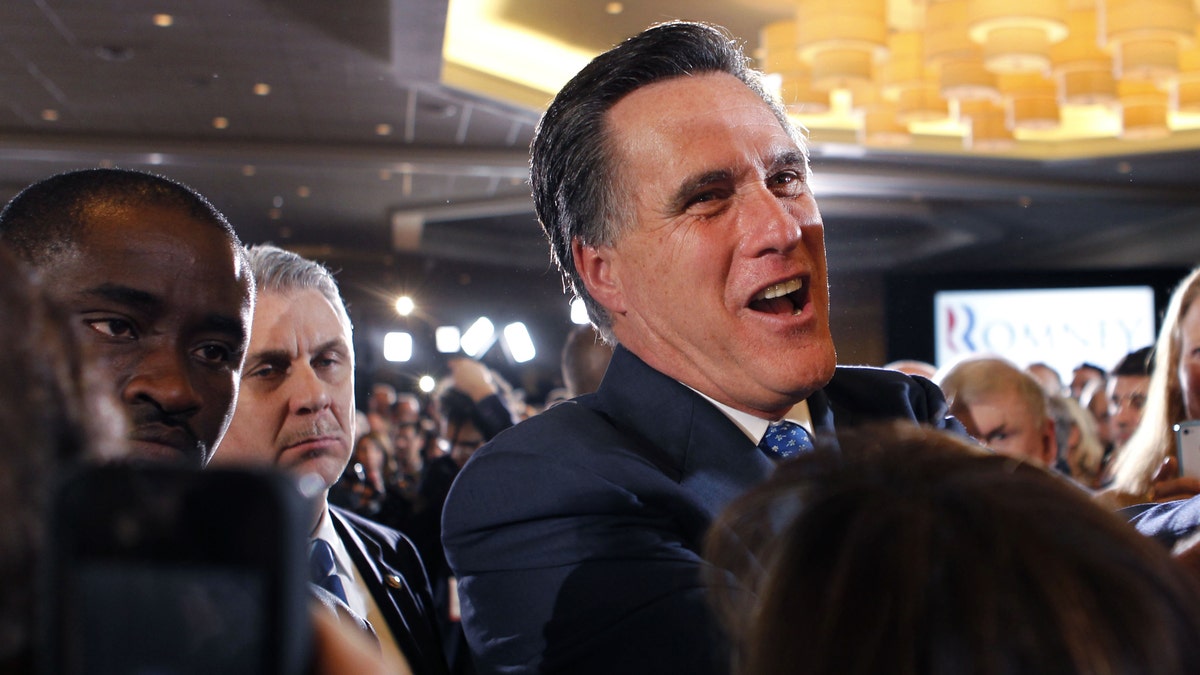
Republican presidential candidate, former Massachusetts Gov. Mitt Romney, greets supporters at his election night party in Boston, Tuesday, March 6, 2012. (AP Photo/Gerald Herbert)
Mitt Romney secured a decisive advantage on Super Tuesday but also suffered several defeats, highlighting the frontrunner’s inability to unite the Republican Party behind his nomination.
Romney had a home-state win in Massachusetts to go with victories in Vermont and in Virginia, where neither Santorum nor Newt Gingrich qualified for the ballot. He also led in early Idaho caucus returns and — most important — padded his lead for delegates to the Republican National Convention.
But a resurgent Santorum broke through in primaries in Oklahoma and Tennessee and in the North Dakota caucuses, while Newt Gingrich scored a home-field win in Georgia — fresh evidence that they retain the ability to outpace the former Massachusetts senator in parts of the country despite his huge organizational and financial advantages.
Texas Rep. Ron Paul pinned his hopes on Alaska as he scratched for his first victory of the campaign season.
For Latinos, Immigration is More Personal Than Political, Poll Says
The most contentious electoral battlefield was Ohio, where Romney trailed for much of the night before forging ahead. With 96 percent of the ballots counted, Romney led by only 12,000 of the 1.1 million votes cast -- a one percentage point advantage.
Likely Latino voters favor Mitt Romney for the GOP nomination with 35 percent support, compared to Texas Rep. Ron Paul's 13 percent, former Speaker of the House Newt Gingrich's 12 percent, and former Pennsylvania Sen. Rick Santorum's 9 percent, according to a Fox News Latino poll released Monday.
None of the Republican candidates inspire Hispanic voters much, however. No GOP hopeful earned more than 14 percent support in head-to-head matches against Obama, the poll found.
Romney's expected victories in Massachusetts, Virginia and Vermont, coupled with his struggle against Rick Santorum in Ohio, will not change GOP operatives' conviction that he is the likeliest nominee. He still has the most delegates, money, organization and experience. And his opposition is still divided among three rivals.
Latinos Overwhelmingly Support DREAM Act and Path to Citizenship, Poll Says
“This is a process of gathering enough delegates to become the nominee, and I think we're on track to have that happen," Romney told reporters as he arrived home in Massachusetts to vote in the primary.
Later, he told supporters, "I'm going to get this nomination."
Romney picked up at least 129 delegates during the evening, Santorum 47, Gingrich 42 and Paul at least 10.
That gave the former Massachusetts governor 332, more than all his rivals combined, a total that included endorsements from members of the Republican National Committee who automatically attend the convention and can support any candidate they choose. Santorum had 139 delegates, Gingrich 75 and Paul 35. It takes 1,144 delegates to win the nomination at the Republican National Convention in Tampa, Fla., this summer.
Santorum waited until Oklahoma and Tennessee fell into his column before speaking to cheering supporters in Ohio.
"We're going to win a few. We're going to lose a few. But as it looks right now, we're going to get a couple of gold medals and a whole passel of silver," he said.
Santorum's recent rise has translated into campaign receipts of $9 million in February, his aides announced last week.
Even so, Romney and Restore our Future, the super PAC supporting him, outspent the other candidates and their supporters on television in the key Super Tuesday states.
In Ohio, Romney's campaign purchased about $1.5 million for television advertisements, and Restore Our Future spent $2.3 million. Santorum and Red, White and Blue, a super PAC that supports him, countered with about $1 million combined, according to information on file with the Federal Election Commission, a disadvantage of nearly four to one.
In Tennessee, where Romney did not purchase television time, Restore Our Future spent more than $1 million to help him. Santorum paid for a little over $225,000, and Winning our Future, a super PAC that backs Gingrich, nearly $470,000.
In Georgia, where Gingrich acknowledged he must win, the pro-Romney super PAC spent about $1.5 million in hopes of holding the former House speaker below 50 percent of the vote, the threshold needed to maximize his delegate take.
In all, there were primaries in Virginia, Vermont, Ohio, Massachusetts, Georgia, Tennessee and Oklahoma. Caucuses in North Dakota, Idaho and Alaska rounded out the calendar.
Some 419 delegates were at stake in the 10 states.
Based on reporting by the Associated Press
Follow us on twitter.com/foxnewslatino
Like us at facebook.com/foxnewslatino
